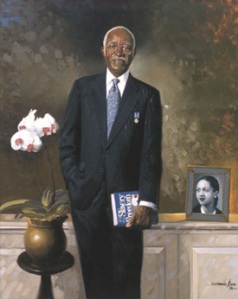Historian John Hope Franklin died on March 25, 2009 at age 94. Franklin was a consummate scholar, a pioneer in African American history, an engaged citizen and a man of great warmth. His honors include the Presidential Medal of Freedom, a MacArthur “Genius” Grant, The Presidencies of both the Organization of American Historians and the American Historical Association and many more. I had the honor being mentored by one of his former students, Betty Balanoff, and of meeting him through Betty.
As important as Franklin’s work has been in reshaping the discipline of history by placing African American history and the history of race at the center of scholarly understandings through such works as ,The Free Negro in North Carolina, 1790-1860, The Militant South, 1800-1861, Reconstruction After the Civil War, and the continually revised and now standard From Slavery to Freedom ; it is his legacy as a citizen scholar and activist scholar that I want to say a little about.
Actually, I want to start by having Professor Franklin say a few words:
Those in a position to speak for the country and to outline its current mission insist that we citizens are undertaking to share with the world the blessings of a free and prosperous society and to spread democracy throughout the world. Under the most favorable circumstances, this would be a remarkable mission; and it is not too much to argue that these are not the most ideal times for such an undertaking. Before we enter upon such an ambitious mission it is well to remember that we ourselves are still in the process of becoming democratic, and it has taken us more than two hundred years to arrive at this stage.
Franklin’s scholarship is a reminder of our nation’s struggles and triumphs in the process of “becoming democratic” and of the distance that remains. This scholarship was informed by his own struggles and his own belief in the ideals of freedom and democracy. The scholarship was also inseparable from his work as a citizen to move our nation toward true democracy and freedom. History was a tool for social change.
Franklin wielded the tool of history in many arenas beyond the class and seminar rooms. He worked with the NAACP legal team on the Brown v. Board of Education case; he publicly and privately supported Rev. Martin Luther King, W.E.B DuBois, Rev. Jesse Jackson and others in the struggles for racial justice, testified against the nomination of Robert Bork to the Supreme Court, served as part of the United States delegation to UNESCO and on the National Council of the Humanities, and headed One America (President Bill Clinton’s initiative on race).
The traditions of activist scholarship and scholarly activism that Franklin exemplified are in danger of being lost. Teaching at all levels is increasingly dominated by the consumerist pressures of vocationalism and entertainment. Scholarship is increasingly informed almost exclusively by the pressures of tenure where narrow debates within the academy matter more than contributions to furthering social justice. In the public sphere, simplistic sound bytes take precedence over informed analysis. Both the academy and the public sphere are poorer because of these developments.
As John Hope Franklin demonstrated, scholarship in general and history in particular have great contributions to make to advancing social justice. I believe that his life also demontsrates that enagement with contemporary social action enriches scholarship.
On the first day of each class I teach, after covering the official scope and goals of the course, I lay the syllabus aside and confess to students that in my own head and heart, the most important goal is to use the knowledge of history to make them better and more engaged citizens. When I do this I think of the Betty Balanoff and how her activism, scholarship and teaching advanced the legacy of John Hope Franklin and how I, in turn am honored to advance Betty’s legacy.
Thomas J. Mertz
Some more links:
Mirror to America: The Autobiography of John Hope Franklin video at the Library of Congress.
Mirror to America: The Autobigraphy of John Hope Franklin.

